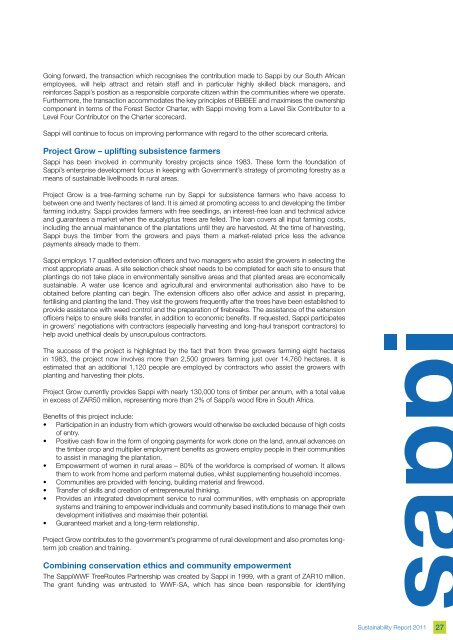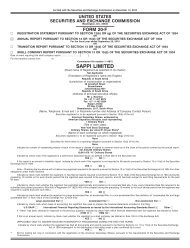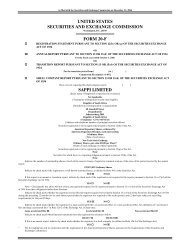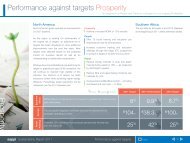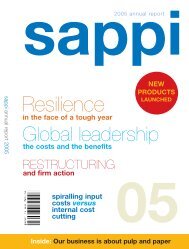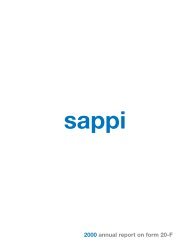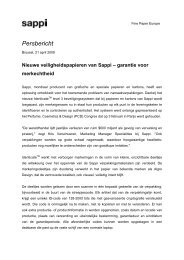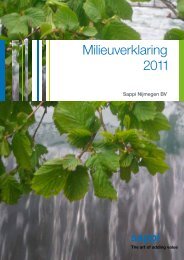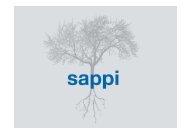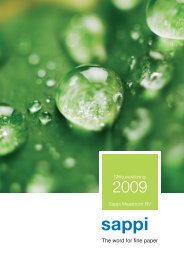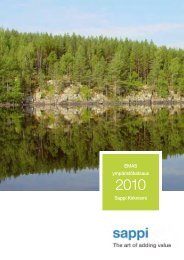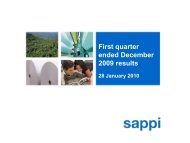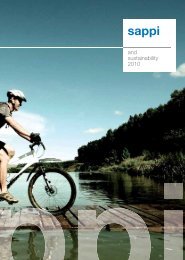Southern Africa - Sappi
Southern Africa - Sappi
Southern Africa - Sappi
You also want an ePaper? Increase the reach of your titles
YUMPU automatically turns print PDFs into web optimized ePapers that Google loves.
Going forward, the transaction which recognises the contribution made to <strong>Sappi</strong> by our South <strong>Africa</strong>n<br />
employees, will help attract and retain staff and in particular highly skilled black managers, and<br />
reinforces <strong>Sappi</strong>’s position as a responsible corporate citizen within the communities where we operate.<br />
Furthermore, the transaction accommodates the key principles of BBBEE and maximises the ownership<br />
component in terms of the Forest Sector Charter, with <strong>Sappi</strong> moving from a Level Six Contributor to a<br />
Level Four Contributor on the Charter scorecard.<br />
<strong>Sappi</strong> will continue to focus on improving performance with regard to the other scorecard criteria.<br />
Project Grow – uplifting subsistence farmers<br />
<strong>Sappi</strong> has been involved in community forestry projects since 1983. These form the foundation of<br />
<strong>Sappi</strong>’s enterprise development focus in keeping with Government’s strategy of promoting forestry as a<br />
means of sustainable livelihoods in rural areas.<br />
Project Grow is a tree-farming scheme run by <strong>Sappi</strong> for subsistence farmers who have access to<br />
between one and twenty hectares of land. It is aimed at promoting access to and developing the timber<br />
farming industry. <strong>Sappi</strong> provides farmers with free seedlings, an interest-free loan and technical advice<br />
and guarantees a market when the eucalyptus trees are felled. The loan covers all input farming costs,<br />
including the annual maintenance of the plantations until they are harvested. At the time of harvesting,<br />
<strong>Sappi</strong> buys the timber from the growers and pays them a market-related price less the advance<br />
payments already made to them.<br />
<strong>Sappi</strong> employs 17 qualified extension officers and two managers who assist the growers in selecting the<br />
most appropriate areas. A site selection check sheet needs to be completed for each site to ensure that<br />
plantings do not take place in environmentally sensitive areas and that planted areas are economically<br />
sustainable. A water use licence and agricultural and environmental authorisation also have to be<br />
obtained before planting can begin. The extension officers also offer advice and assist in preparing,<br />
fertilising and planting the land. They visit the growers frequently after the trees have been established to<br />
provide assistance with weed control and the preparation of firebreaks. The assistance of the extension<br />
officers helps to ensure skills transfer, in addition to economic benefits. If requested, <strong>Sappi</strong> participates<br />
in growers’ negotiations with contractors (especially harvesting and long-haul transport contractors) to<br />
help avoid unethical deals by unscrupulous contractors.<br />
The success of the project is highlighted by the fact that from three growers farming eight hectares<br />
in 1983, the project now involves more than 2,500 growers farming just over 14,760 hectares. It is<br />
estimated that an additional 1,120 people are employed by contractors who assist the growers with<br />
planting and harvesting their plots.<br />
Project Grow currently provides <strong>Sappi</strong> with nearly 130,000 tons of timber per annum, with a total value<br />
in excess of ZAR50 million, representing more than 2% of <strong>Sappi</strong>’s wood fibre in South <strong>Africa</strong>.<br />
Benefits of this project include:<br />
• Participation in an industry from which growers would otherwise be excluded because of high costs<br />
of entry.<br />
• Positive cash flow in the form of ongoing payments for work done on the land, annual advances on<br />
the timber crop and multiplier employment benefits as growers employ people in their communities<br />
to assist in managing the plantation.<br />
• Empowerment of women in rural areas – 80% of the workforce is comprised of women. It allows<br />
them to work from home and perform maternal duties, whilst supplementing household incomes.<br />
• Communities are provided with fencing, building material and firewood.<br />
• Transfer of skills and creation of entrepreneurial thinking.<br />
• Provides an integrated development service to rural communities, with emphasis on appropriate<br />
systems and training to empower individuals and community based institutions to manage their own<br />
development initiatives and maximise their potential.<br />
• Guaranteed market and a long-term relationship.<br />
Project Grow contributes to the government’s programme of rural development and also promotes longterm<br />
job creation and training.<br />
Combining conservation ethics and community empowerment<br />
The <strong>Sappi</strong>WWF TreeRoutes Partnership was created by <strong>Sappi</strong> in 1999, with a grant of ZAR10 million.<br />
The grant funding was entrusted to WWF-SA, which has since been responsible for identifying<br />
Sustainability Report 2011 27


